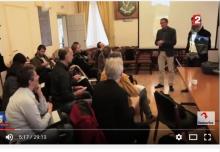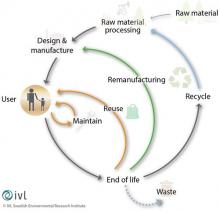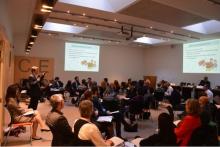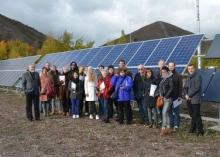The France 2 French national TV has filmed our visit to Loos-en-Gohelle last October, in the framework of a 30 minutes report on the stunning energy transition going on in this former mining town in the North of France. You can see it here on Youtube.
Post-Carbon Cities of Tomorrow
COP21 has demonstrated the pivotal role played by cities in climate change mitigation and adaptation. Beyond technology progress and roll out in urban contexts, the solution lies in governance and societal changes. For such reforms to take place locally, the right framework needs to be set up at national and European level. The 2050 Post Carbon Cities of Tomorrow (POCACITO) Roadmap puts forward key guidance, as the result of a two-year consultation process with stakeholders in Brussels and from targeted cities. Further to a comprehensive outline of the policy context and challenges, the POCACITO Roadmap formulates 11 recommendations, 5 of which targeting national and EU institutions, with the remainder aimed at local elected representatives themselves. Adopting an integrated approach, the...
The transfer of good practices among cities in Europe has been an important driver of local climate action since the forerunner cities became active in climate policy in the early 1990s. Although lesson-drawing has taken place since then, particularly by forerunner cities, there are also limitations. The diversity of cities with respect to their size, geographical location, social and economic structures and their position within national governance systems needs to be acknowledged. Still, lessons can be learned in different areas: strategic approaches to post-carbon transitions, evidence-based institutional learning, visibility and awareness-raising through demonstration projects, and sector-specific initiatives (for the built environment, transport, waste, urban planning, etc.). Given the diversity of cities and towns in Europe, there is no one-size-fits-all approach...
The use of urban indicators and benchmarking exercises by local governments has proliferated in the last few years, mainly owing to the sustainability agenda. These kinds of indicators aim at measuring, tracking, assessing and comparing cities’ performance, with a view to guiding policy formulation and implementation. Diverse frameworks for sustainable development indicators have emerged, mostly produced by European and international organisations. Recently, initiatives involving key performance indicators (KPIs) have been influenced by the smart city agenda and the digital revolution, in terms of content, data collection, analysis and dissemination processes. ICT, big data, open data, real-time information, data analytics, dashboards and operation centres are some of the main components of this movement. Taking into account the different KPI initiatives and...
In the EU, cities are beginning to address their local carbon emissions through energy efficiency measures, improvements in waste management and investments in renewable energy. Yet, despite the measures, so far there has been little progress on how to reduce the individual footprint, which to a large degree stems from consumption and the indirect footprint that comes with it. As private consumption drives growth, a reduction of consumption as a way to reduce environmental impacts is often seen as undesirable from an economic perspective. Therefore, increased consumption, often encouraged at the political level, is in contradiction to what is needed, creating a catch-22 situation. The result from the POCACITO project shows that changes in consumption patterns are inescapable in order...
The Final Conference of the POCACITO project on “Post-carbon Cities of tomorrow – Building an urban long term vision together”, took place on 21 October 2016 at CEPS in Brussels. The main objective of the conference was to present the key outputs and findings of POCACITO to local public institutions, European institutions, regional stakeholders and representatives from the research field, business environment and civil society. In the same time, the event officially introduced the 2050 EU post-carbon cities roadmap as a working document and gathered feedback and suggestions from the participants and stakeholders invited. The Final Conference highlighted a creative approach for dissemination and participant engagement. The messages of the sessions drew attention to the need for an integrated approach...
A number of city-led initiatives have gained momentum in international cooperative action in 2016 ; for example, the Global Covenant of Mayors initiative, the entry into force of the Paris Agreement, and the Habitat III UN Conference on Housing and Sustainable Urban Development. Yet, despite increasing awareness of these developments and an expectation that cities will play a key role in the transition to a post-carbon future, citizens, or more broadly stakeholders, have so far not fully participated in the decision-making process. This paper presents lessons from the POCACITO stakeholder consultation process, which is characterised by visioning, backcasting and quantification, and recommends that the EU, member states and cities focus on adapting governance models, increase support for capacity building, and...
The second POCACITO study tour took place last October in Paris, Loos-en-Gohelle and Brussels. Participants were mainly urban practitioners coming from all over Europe, but also from China and the US, many of them representing the 8 POCACITO case study cities . The topics covered climate change adaptation and mitigation, energy transition, innovative urban greening actions, energy-efficient renovation of buildings, local governance and cooperation with citizens and local stakeholders. Paris: How to build the 2050 vision of carbon neutral cities Starting the visits in the French capital, our group was invited at the Paris City Hall to attend a conference entitled "Looking far ahead, taking action closely : how to build the 2050 vision of carbon neutral cities" . This...
How creating visions of a post-carbon urban future can help generate a positive image of the transformed city in which urban life quality, economic and social vibrancy improve for citizens, while carbon emissions decrease? Utilising urban policies to facilitate transition towards a post-carbon future requires a drastic change of direction in current policies. Yet the uncertainty associated with change can often stifle action. Creating a roadmap based on such visions and scenarios translates the envisaged and necessary transformations into feasible small-scale actions. Developing a policy programme based on post-carbon visions and roadmaps can transform the ambitious goal of achieving a post-carbon society into manageable and measureable steps of change, without losing sight of the long-term goal. Visions are thus a...
A transition towards sustainability is needed - at all levels and in all sectors. Check out the brand new POCACITO video on how to facilitate the transition of EU cities to a forecasted sustainable or “post‐carbon” economic model!








